What is the gastric sleeve?
The sleeve gastrectomy or “gastric sleeve” is a surgical procedure that involves the removal of about 80% of the stomach. The remaining portion of the stomach will be shaped into a tube-like structure or a “sleeve” that is about the size of a banana.
The gastric sleeve works by:
- Reducing the size of the stomach, therefore, limiting the amount of food that you are able to eat
- Affecting hormones related to hunger, resulting in decreased appetite and food intake
- Helping get your metabolism back on track
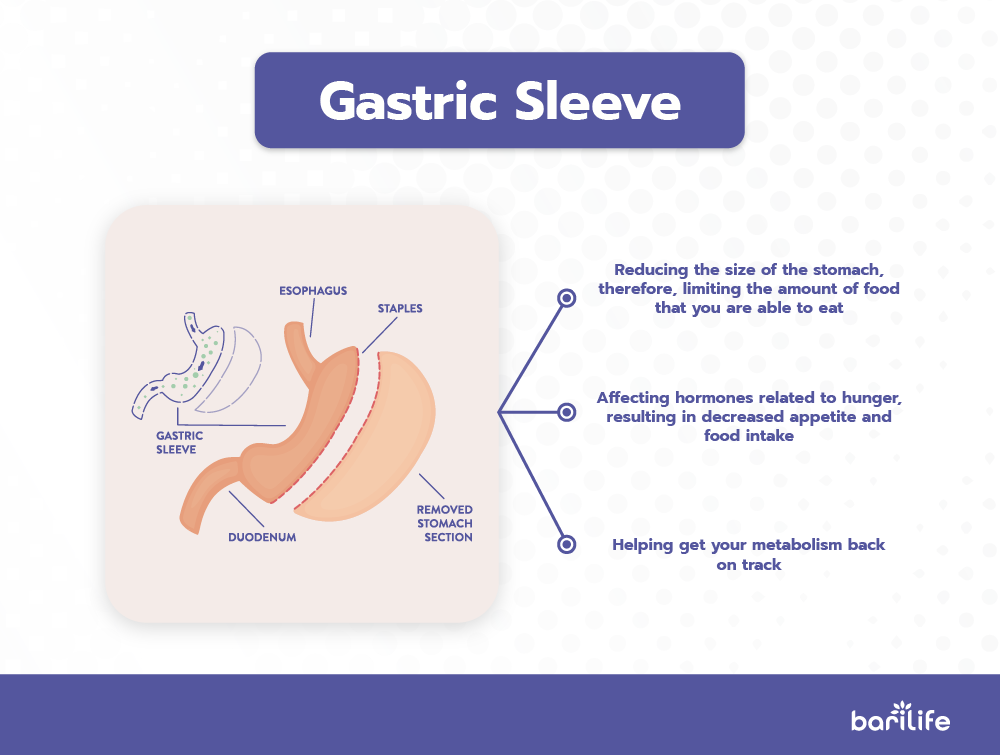
What is Gastric Bypass surgery?
The Roux-en-y gastric bypass or “gastric bypass” involves making changes to both the stomach and small intestines. In this procedure, a small gastric pouch, about the size of an egg will be created by stapling off the upper section of the stomach and then attaching it to a section of the intestines called the Roux limb.
Gastric Bypass works by
- Reducing the size of the stomach, therefore, limiting the amount of food you are able to eat
- Limiting the number of calories and nutrients that your body can absorb
- Affecting hormones related to hunger, resulting in decreased appetite and intake
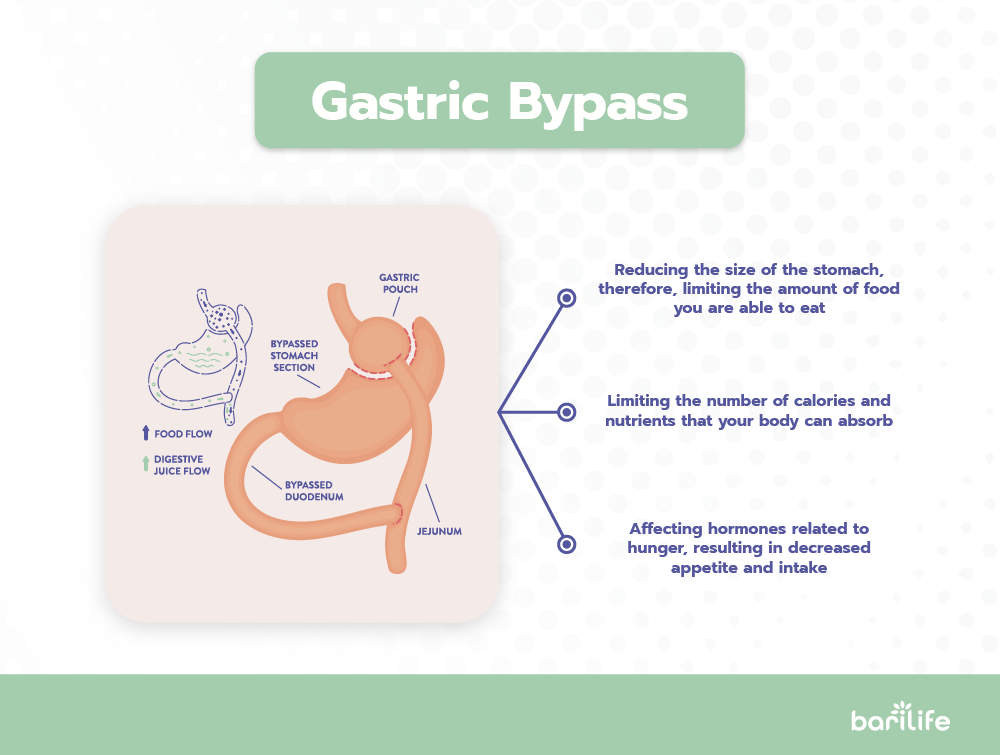
As you can see both the gastric sleeve and gastric bypass reduce the size of the stomach. The major difference between these two procedures is that gastric bypass also involves removing a portion of the small intestine.
Which is better, the gastric sleeve or gastric bypass?
On one hand, the Roux-en-Y Gastric Bypass is considered the “Gold Standard” of bariatric surgery and is known as one of the most effective forms of bariatric surgery. And, on the other, the gastric sleeve is one of the most popular forms of bariatric surgery. It is less invasive and has comparable results to gastric bypass.
Both of these surgeries have been proven to be safe and effective at promoting weight loss, so the answer really depends on your personal preference. This article will elaborate on the major differences between the gastric sleeve and the gastric bypass to help you determine which procedure might be better for you.
Let’s start with a few key points about the procedures themselves
Both the gastric sleeve and gastric bypass can be performed as a laparoscopic or an open procedure. On average the gastric sleeve can take anywhere from 30 min to 2 hours to perform while gastric bypass surgery can take anywhere from 45 min to 3 hours. In general, the gastric sleeve procedure is shorter when compared to gastric bypass, but the duration of the surgery depends on each particular case.
Gastric bypass surgery is a more invasive procedure when compared to the gastric sleeve because it involves modifying multiple organs. You may think this indicates that you will need to spend more time in the hospital following your procedure but that’s not necessarily the case. The average hospital stay following each of these procedures is about 1-3 days.
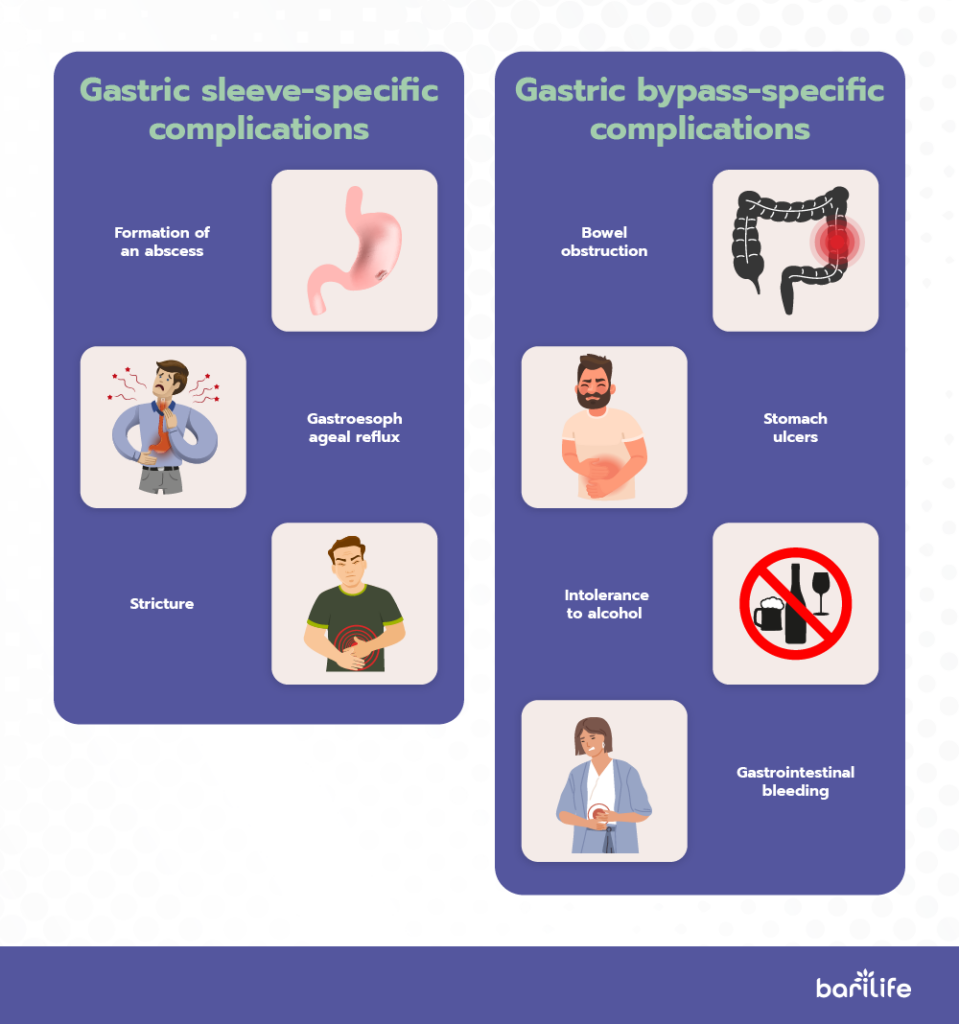
Now let’s take a look at the recovery process
Although the hospital stays are similar, gastric bypass surgery has a slightly longer recovery time overall when compared to the gastric sleeve. In general, most people are fully recovered from the gastric sleeve at the 6-week to 2-month mark. But, with gastric bypass, some people are only 80% recovered at this time and a full recovery can take up to 3 months.
The rate of complications is similar between the two forms of surgery. Overall, the rate of complications in bariatric surgery is about 4%. Some studies suggest that the rate of complications related to the gastric sleeve is about 3.7% while the rate of complications related to gastric bypass is about 4.3%.
Let’s compare the common types of complications following these procedures
General complications that can occur following both the gastric sleeve and gastric bypass include
- Bleeding
- Blood clots
- Pneumonia
- Inflammation of the gallbladder and gallstones
- Hernia
- Nutrient Deficiency
- Nausea, vomiting, and/or diarrhea that may be accompanied by sweating otherwise known as Dumping Syndrome
- Leak
There are some complications that are more specific to each individual type of surgery
Gastric sleeve-specific complications
- Formation of an abscess
- Stricture
- Gastroesophageal reflux
Gastric bypass-specific complications
- Bowel obstruction
- Gastrointestinal bleeding
- Intolerance to alcohol
- Stomach ulcers
Now, let’s take a look at the success rates and overall weight loss associated with these two procedures
In general, gastric bypass surgery is known for resulting in more rapid weight loss and a higher percentage of weight loss overall. This may lead you to automatically want to have gastric bypass surgery over the gastric sleeve, but it’s important to note that the percentages overall are very similar, and the percentage of malabsorption/ malnutrition is higher in gastric bypass patients so not all of the weight loss may be considered healthy weight loss.
Both procedures require significant lifestyle modifications. When lifestyle modifications are not followed then there is a high likelihood that there will be physical consequences or adverse side effects or symptoms. One example of this is dumping syndrome. Dumping syndrome is a group of symptoms that can occur after eating in people who have had bariatric surgery. Up to 85% of bariatric surgery patients experience some form of dumping syndrome. When looking at specific foods or drinks the rate of dumping syndrome varies between the two types of surgery. 27% of gastric sleeve patients and 44% of gastric bypass patients reported at least one sign or symptom of dumping syndrome after they consumed sweets. Following alcohol intake, 14.5% of gastric sleeve and 17.3% of gastric bypass recipients experiences some form of dumping syndrome.
These statistics are important to factor into your decision regarding which bariatric surgery to choose. The gastric sleeve has similar statistics when looking at dumping syndrome overall, but gastric bypass has higher rates of dumping syndrome when looking at specific food intake. Gastric bypass is associated with a higher risk of food intolerances following surgery, while the gastric sleeve is more commonly associated with better tolerance to foods and better quality of life long-term.
Before you go, let’s look at a side-by-side comparison of the gastric sleeve and gastric bypass
| Gastric Sleeve | Gastric Bypass | |
| Qualifications for surgery | BMI >40 or BMI >35 with at least one obesity-related disease | BMI >40 or BMI >35 with at least one obesity-related disease |
| Operative Time | 30-120 min | 45-90 min |
| Average Hospital Stay | 1-3 days | 1-3 days |
| Options for open procedure and laparoscopic procedure | Can be performed open or laparoscopically | Can be performed open or laparoscopically |
| Complexity | Less complex involves primarily the stomach | More complex involves the stomach and small intestine |
| Recovery | Shorter recovery process overall | Longer recovery process overall |
| Cost | Generally, less expensive | Generally, more expensive |
| Rate of complications | Less than 4% | More than 4% |
| Malnutrition/ Malabsorption risk | Lower risk of malnutrition/malabsorption | Higher risk of malnutrition/malabsorption |
| Weight loss at 1 month | 20% EBW of Excess Body Weight (EBW) | 17% of Excess Body Weight (EBW) |
| Weight loss at 3 months | 30% of EBW | 25-35% of EBW |
| Weight loss at 6 months | 49% of EBW | 53% of EBW |
| Weight loss at 1 year | 60% of EBW | 60-70% of EBW |
| Weight loss at 18 months to 2 years | 65% of EBW | 75-80% of EBW |
| Remission or Improvement of Obesity Related Diseases | No significant differences noted between the two types of surgery | No significant differences noted between the two types of surgery |
| Success Rates | 85% | 68-74% |
| Weight Regain | No significant differences in the occurrence of weight regain between the two types of surgery | No significant differences in the occurrence of weight regain between the two types of surgery |
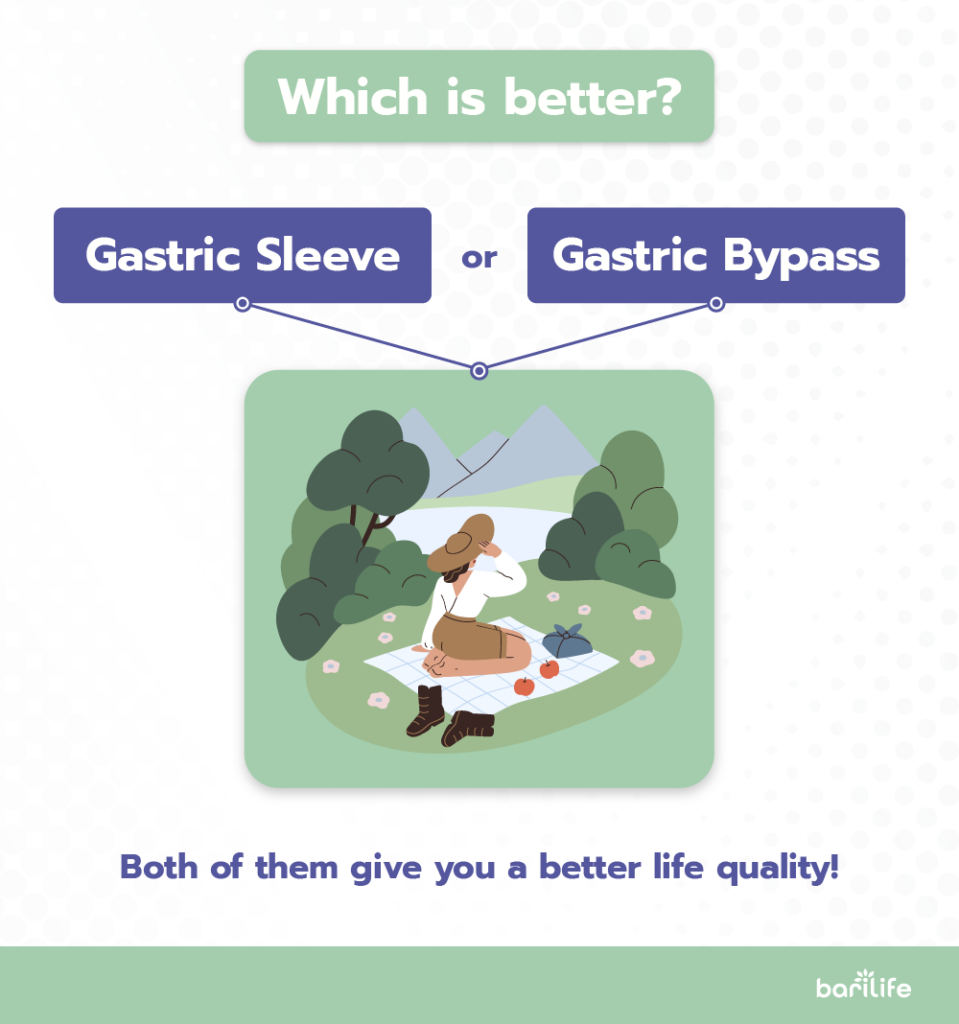
Deciding between the can be a tough choice. The gastric sleeve is associated with a faster recovery, better tolerance to food, and a higher quality of life long-term. Whereas gastric bypass is associated with more rapid weight loss and better long-term weight loss outcomes.
It’s important to note that the biggest determinant of success and weight loss following surgery is not the type of surgery that you have, but your adherence to the necessary diet and lifestyle modifications.



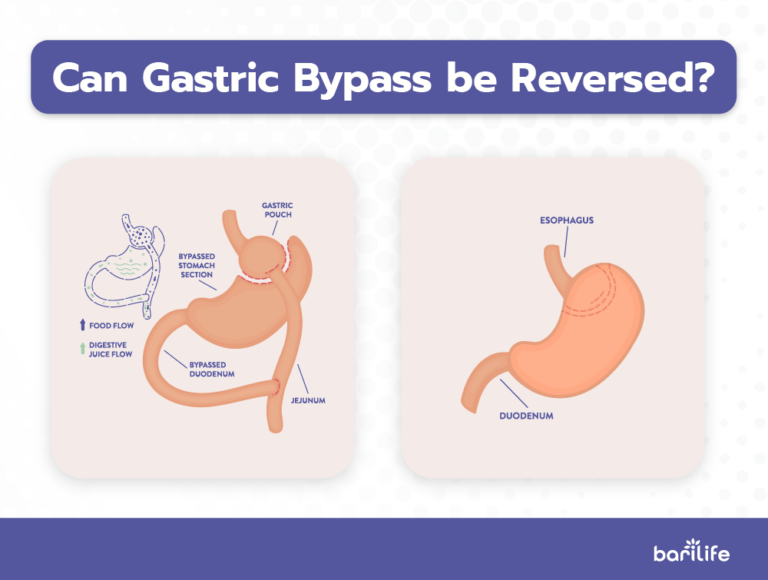
What are your tips and tricks to post-bariatric success?